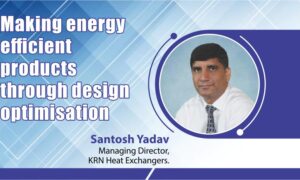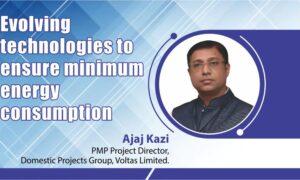Neeraj Gupta, Senior General Manager, Living Environment Division, Mitsubishi Electric India Pvt. Ltd. In an interview with Megha Iyer, talks about standardising integrated MEP designs for safety and efficient IAQ in public spaces. He also spoke about the availability of skilled labour in Tier II and Tier III cities.
According to you, where do we stand in terms of demand for safety and efficiency embedded MEP designs in India?
The Mechanical, Electrical and Plumbing (MEP) designs are gaining importance due to increasing infrastructural development. Nowadays, clients are very much aware of the safety and efficiency of HVAC systems due to existing pandemic conditions and high energy costs. The need for optimum design and following standard installation practices of MEP systems has an impact on energy efficiency. MEP design needs to consider the best practices that maximise safety and efficiency at all levels.
With safety being the new normal, do you think standard integration of MEP designs should be a mandate for maintaining an IAQ?
Yes, it should be mandatory to maintain Indoor Air Quality (IAQ) by integrating standards of MEP Designs. Indoor Air Quality (IAQ) refers to the air quality within buildings and structures, especially as it relates to the health and comfort of building occupants. Through understanding and controlling of common pollutants in indoors can help reduce your risk of indoor health concerns. Indoor pollution sources that release gases or particles into the air are the primary cause of indoor air quality nuisance. Inadequate ventilation can increase indoor pollutant levels by not bringing in enough outdoor air to dilute emissions from indoor sources and by not carrying indoor air pollutants out of the area. High temperature and humidity levels can also increase concentrations of some pollutants. Therefore, it is advisable to test the indoor air quality periodically.
How do you see the implementation of codes and standards while designing and installing HVAC safety systems in India?
It’s always a positive sign that people are concerned about following national or international guidelines and standards of the HVAC system’s safety. The set standards define the industry’s agreed-upon minimum technical requirements, procedures, guidelines, and instructions for engineers, designers, or manufacturers. They also establish the industry’s minimum standard of care. The designers in the HVAC industry are growing familiar with codes and standards. The implementation of codes and standards will improve the quality of HVAC design and installation. Also, this will help to create an accident and hazard-free environment.
How far is limited availability of skilled HVAC professionals impacting the growth of your business?
The skilled HVAC professionals are still in the nurturing stage in India, and this has led to a major impact on the quality and overall cost of work execution. There is a shortage of HVAC Professionals in Tier II and Tier III type cities, which creates a challenge for us to deliver the best quality of services in those cities, sometime we have to arrange professionals from major cities to work at sites locating in Tier-II and Tier-III towns. To cater to these challenges, we are conducting a regular training program to fulfil the need of skilled HVAC Professionals across the country.
What products and technologies do you offer for the safety of cooling, ducting and water distribution system?
Mitsubishi Electric Air Conditioning Systems provide various types of technologies implemented in its products that keep safety on priority. Out of the vast product portfolio, we have a ‘Lossnay’ ventilation system. It optimizes Indoor air quality inside a building by exchanging temperature & humidity between Exhaust Air and Fresh Air supply. Allour Air Conditioning Indoor Units are designed with Metal Box for Printed Circuit Board (PCB), which prevents the origin of fire from HVAC systems. During the design stage, we also take care of Refrigerant Concentration Limit for Variable Refrigerant Flow (VRF) system projects.
How logistics is impacting the bottom line of your business in the COVID scenario?
During initial days post lockdown managing logistic was a challenge. It was difficult to manage the end to end operations. But currently it is almost back to normal without much impact on costing or efficiency of operations. We will continue to upgrade our services to support our business partners.
Cookie Consent
We use cookies to personalize your experience. By continuing to visit this website you agree to our Terms & Conditions, Privacy Policy and Cookie Policy.















